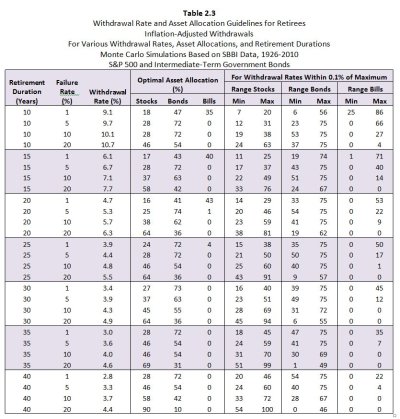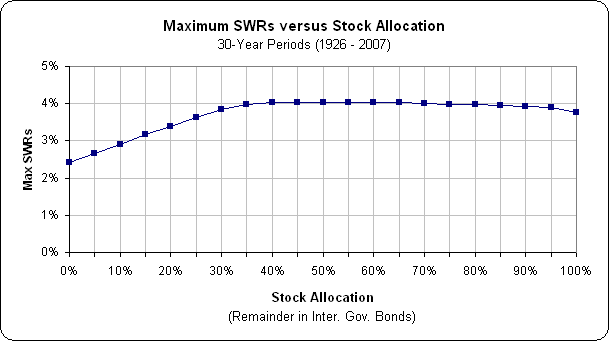DH will be taking early retirement some time this year at age 55 (he hasn't submitted his paperwork yet). I will be 55 in the summer.
Here's what we have saved for retirement:
401K: $1,243,000
IRA: $92,000
Taxable Accounts: $293,000
Total: $1,628,000
I would appreciate anyone's thoughts or assistance regarding SWRs, asset allocation, and taxes.
I have been reading on initial sustainable withdrawal rates, and believe that in his first year of full retirement (2013) that his non-COLAed pension in addition to a $30K draw down will be ample for everyday living expenses (we could live on less if we had to).
ISWR
Here's where I get confused. We want to do some travel, but I don't know how often it will be or how expensive. We also will need or want a new car in the next (5) years. Should I take a "chunk of money" and "pretend" it's not there, earmarking it for those things before I determine our initial SWR?
ASSET ALLOCATION
DH is getting more and more conservative as time goes on. I think the max that he wants to "risk" now in his 401k is about $200K. I already have the IRA at a 50/50 allocation. Allocating $250K to equities equates to a 15/85 asset allocation between equities and fixed income if you consider the entire portfolio. From what I have read, our ISWR is low enough that it is probable doable without running out of money. Any thoughts on this and where the heck do I put all that fixed income?
Our choices for fixed income in his 401k are:
Government Short Term Investment Fund (Short term fixed income category)
Stable Value Fund (money market)
TIPs Fund (Inflation Protection Fixed Income Index)
Broad Market Bond Index Fund (Fixed Income)
TAXES
Even though we only need a $30K draw down (indexed to inflation), I am thinking that we should be drawing down his 401k as much as possible between 2013 and the time we decide to take SS. We will evaluate when to actually take it every year after we reach age 62. My SS will be minimal (<$400/mo) so we may opt to take it ASAP. I am concerned about the tax ramifications of not drawing down the tax deferred accounts and dealing with taxes after age 70 1/2.
Also, I have considered slowly converting the traditional IRA to a Roth IRA. I haven't researched IF we can or how to do it much yet though.
Okay, that's all I can think of right now; but I'm sure a lot of other questions will pop up. I would appreciate any inputs.
Here's what we have saved for retirement:
401K: $1,243,000
IRA: $92,000
Taxable Accounts: $293,000
Total: $1,628,000
I would appreciate anyone's thoughts or assistance regarding SWRs, asset allocation, and taxes.
I have been reading on initial sustainable withdrawal rates, and believe that in his first year of full retirement (2013) that his non-COLAed pension in addition to a $30K draw down will be ample for everyday living expenses (we could live on less if we had to).
ISWR
Here's where I get confused. We want to do some travel, but I don't know how often it will be or how expensive. We also will need or want a new car in the next (5) years. Should I take a "chunk of money" and "pretend" it's not there, earmarking it for those things before I determine our initial SWR?
ASSET ALLOCATION
DH is getting more and more conservative as time goes on. I think the max that he wants to "risk" now in his 401k is about $200K. I already have the IRA at a 50/50 allocation. Allocating $250K to equities equates to a 15/85 asset allocation between equities and fixed income if you consider the entire portfolio. From what I have read, our ISWR is low enough that it is probable doable without running out of money. Any thoughts on this and where the heck do I put all that fixed income?
Our choices for fixed income in his 401k are:
Government Short Term Investment Fund (Short term fixed income category)
Stable Value Fund (money market)
TIPs Fund (Inflation Protection Fixed Income Index)
Broad Market Bond Index Fund (Fixed Income)
TAXES
Even though we only need a $30K draw down (indexed to inflation), I am thinking that we should be drawing down his 401k as much as possible between 2013 and the time we decide to take SS. We will evaluate when to actually take it every year after we reach age 62. My SS will be minimal (<$400/mo) so we may opt to take it ASAP. I am concerned about the tax ramifications of not drawing down the tax deferred accounts and dealing with taxes after age 70 1/2.
Also, I have considered slowly converting the traditional IRA to a Roth IRA. I haven't researched IF we can or how to do it much yet though.
Okay, that's all I can think of right now; but I'm sure a lot of other questions will pop up. I would appreciate any inputs.



 I have been using a retirement calculator on an MSN website, but I'll play with FIRECalc and see what it tells me.
I have been using a retirement calculator on an MSN website, but I'll play with FIRECalc and see what it tells me. (and will continue to do so). I also screwed up big time
(and will continue to do so). I also screwed up big time 